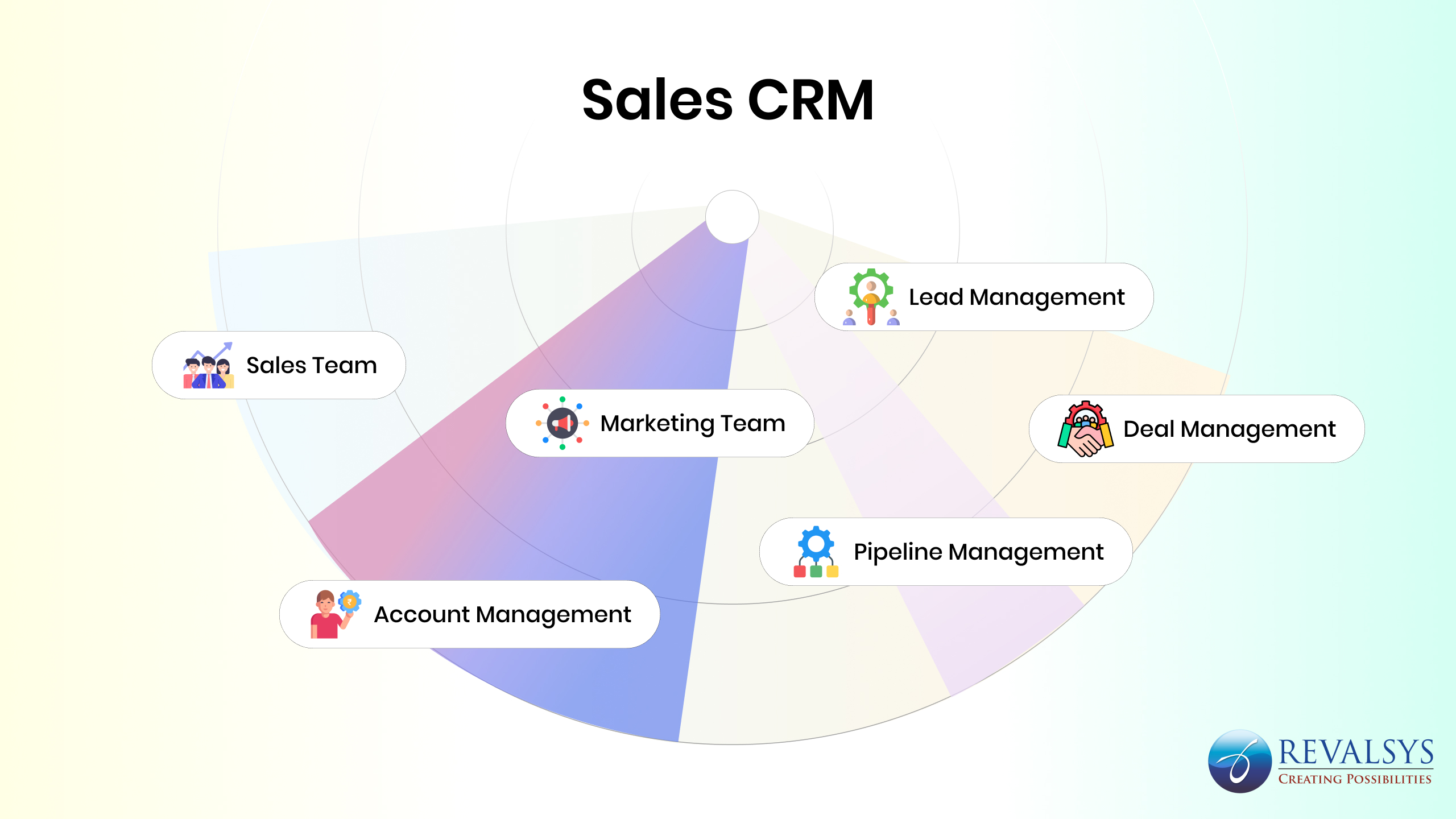
Sales CRM – Empowering Businesses of All Sizes to Sell Smarter
In every growing business, there’s one thing that keeps everything moving customers.
But as your customer base expands, so does the complexity of managing relationships, tracking leads, following up on prospects, and ensuring deals don’t slip through the cracks.
That’s where a Sales CRM (Customer Relationship Management) system comes into play a tool designed not just to organize contacts, but to transform how your sales and marketing teams collaborate, close deals, and grow revenue.
Imagine your sales team knowing exactly where every prospect stands, your marketing team seeing which campaigns are driving real conversions, and your management team accessing real-time insights with a single click.
That’s the power of a modern Sales CRM — one platform connecting teams, automating tasks, and turning every opportunity into a success story.
What is a Sales CRM?
A Sales CRM (Customer Relationship Management for Sales) is a technology platform that helps businesses manage their entire sales lifecycle — from capturing leads to closing deals.
It’s not just a contact database. It’s your digital command centre for everything related to customer engagement, team productivity, and business growth.
At its core, a Sales CRM enables you to:
- Capture leads automatically from multiple sources like websites, campaigns, and referrals.
- Track interactions through calls, emails, meetings, and follow-ups.
- Manage pipelines to visualize where each deal stands and what actions are needed next.
- Automate repetitive tasks like reminders, reporting, and updates.
- Analyze performance using dashboards and insights to make data-driven decisions.
Whether you’re a startup trying to get your first 50 customers or a large enterprise handling thousands of leads every month — a Sales CRM scales with your needs.
Building Collaboration Across Teams

One of the biggest challenges for growing businesses is breaking silos between sales and marketing teams.
Marketing generates leads — but if sales doesn’t follow up effectively, those leads go cold. Sales teams often blame marketing for “low-quality leads,” while marketers argue that sales isn’t nurturing prospects properly.
A Sales CRM bridges the gap between sales and marketing teams, ensuring collaboration, transparency and seamless information flow. It provides both teams with a shared platform to monitor leads, track customer interactions, and assess campaign outcomes — creating a clear path from the first contact to successful conversion.
- Sales Team: Utilizes the CRM to nurture leads, manage opportunities, and stay organized with activity tracking and reminders.
- Marketing Team: Leverages insights to run targeted campaigns, measure ROI, and hand overqualified prospects to the sales team efficiently.
- Management & Leadership: Gains real-time visibility into sales pipelines, performance analytics, and closure efficiency to make data-driven decisions.
A Sales CRM bridges this gap. Here’s how:
1. Unified Data Access
All customer data from first website visit to final purchase — is stored in one place.
Sales teams can see where the lead came from, what campaign attracted them, and which product they’re interested in. Marketing teams, in turn, can track which campaigns bring in leads that actually convert into deals.
2. Transparent Communication
The CRM acts as a shared workspace — every call, note, or update is visible to relevant team members. This means no more chasing spreadsheets or missed emails. Everyone is on the same page.
3. Automated Workflows
Workflows connect teams automatically when marketing qualifies a lead, it instantly moves to the sales pipeline. Sales reps get alerts to follow up, while marketing gets feedback on conversion results.
4. Improved Customer Experience
When teams collaborate seamlessly, the customer feels it. They receive timely responses, personalized offers, and consistent communication, all of which build trust and loyalty.
Core Functionalities of a Sales CRM
Let’s dive deeper into what makes a Sales CRM such a powerful business tool.
It’s more than a tracking system it’s a complete ecosystem for managing every stage of your customer journey.
1. Lead Management
Every sale begins with a lead but how well you manage that lead decides your success. With a CRM, leads are captured automatically from multiple sources: website forms, social media, marketing campaigns, or referrals. Each lead is enriched with details like contact info, communication history, and engagement level.
You can:
- Assign leads to specific sales reps automatically.
- Prioritize high-quality leads with scoring systems.
- Set reminders for follow-ups to ensure no opportunity is missed.
In short, lead management turns potential interest into real opportunity.
2. Activity Management
Sales success depends on timely actions — calls made, meetings held, emails sent, and follow-ups completed. A Sales CRM helps you plan, track, and manage all your sales activities in one place. It’s like having a digital sales assistant that ensures you never forget a follow-up or miss an appointment.
Features include:
- Scheduling meetings and calls directly within the CRM.
- Logging every communication automatically.
- Tracking productivity metrics for each sales rep.
With everything organized, your sales team can focus on what they do best selling, not searching for data.=
3. Prospect Management
Once a lead shows interest, they become a prospect — and that’s where the real relationship-building begins. CRM systems help nurture these prospects through personalized communication, product demos, and ongoing engagement.
You can:
- Segment prospects based on behavior, interests, or demographics.
- Automate nurturing emails or drip campaigns.
- Track which prospects are most likely to convert using scoring models.
This ensures that your team spends time on the right prospects, improving conversion rates and shortening sales cycles.
4. Deal Management
A CRM provides a clear view of your entire sales pipeline — from initial contact to deal closure. You can see where each deal stands, its value, associated tasks, and next steps.
Deal management features include:
- Visual pipeline boards with drag-and-drop stages.
- Revenue forecasting based on deal values and probabilities.
- Custom workflows for deal approvals or discounts.
This helps sales managers identify bottlenecks, track team performance, and focus on deals that matter most.
5. Closure Management
The final stage — closing the deal is where many businesses lose momentum.
Missed documents, delayed approvals, or unclear communication can cost valuable opportunities.
A CRM streamlines closure by:
- Setting automated alerts for pending actions.
- Managing proposals, quotations, and contracts within the platform.
- Ensuring timely follow-up with clients and internal teams.
Once the deal is closed, the CRM also helps with post-sale engagement onboarding, upselling, or customer satisfaction tracking.
Benefits of a Sales CRM

A Sales CRM is not just a tool — it’s a growth catalyst. It empowers your teams, enhances customer experience, and gives management complete visibility.
Here are the key benefits:
1. Enhanced Productivity: Automating data entry, reminders, and reporting saves hours of manual work — allowing your teams to focus on selling and strategizing.
2. Better Lead Conversion: By tracking every touchpoint, your team knows when and how to approach each lead — leading to higher conversion rates.
3. Real-Time Insights: Dashboards show sales trends, team performance, and revenue forecasts — enabling faster, smarter decisions.
4. Customer Retention: CRM ensures consistent engagement even after sales — tracking satisfaction, complaints, and renewal opportunities.
5. Stronger Collaboration: Marketing, sales, and management all work on one unified platform — eliminating miscommunication and delays.
6. Scalable Growth: Whether you have a small sales team or a large national operation, the CRM grows with you adapting to your structure, volume, and goals.
Why Businesses Need a Sales CRM
In today’s competitive landscape, having a Sales CRM isn’t a luxury — it’s a necessity.
Here’s why businesses of all sizes should embrace it:
1. For Small Businesses
When you’re starting out, every lead counts. A CRM helps you organize prospects, follow up efficiently, and close deals faster all without losing track of any customer. It’s like giving your small team the power of an enterprise setup.
2. For Growing Mid-Sized Companies
As your customer base grows, spreadsheets and emails can no longer handle the complexity. You need automation, team coordination, and visibility. A CRM ensures scalability — helping you manage hundreds of deals with clarity and consistency.
3. For Large Enterprises
Enterprises need control and data intelligence. A CRM integrates with ERP, marketing, and support systems — creating a unified customer view across departments. It offers analytics, territory management, and custom workflows for large-scale operations.
4. For Management and Leadership
With a CRM, management gets real-time dashboards showing:
- Pipeline health
- Conversion ratios
- Sales forecasts
- Team performance
- No waiting for manual reports — just instant visibility and actionable insights.
5. For Marketing Teams
Marketing efforts finally get measurable impact. They can see which campaigns generate quality leads, how they perform, and what to optimize for better ROI.
6. For Sales Teams
Sales reps get a clear roadmap which leads to prioritize, when to follow up, and how close they are to meeting targets. They spend less time searching for information and more time building relationships.
7. For Customers
Ultimately, the biggest winners are your customers. They receive timely responses, personalized offers, and consistent support resulting in satisfaction and loyalty.
The Future of Selling is Connected
- The sales world is evolving rapidly driven by data, automation, and customer-centricity.
- A Sales CRM is the bridge between your business goals and customer expectations.
- Whether it’s tracking every conversation, nurturing every lead, or forecasting next month’s revenue your CRM ensures nothing slips through the cracks.
- In short, it helps your teams work smarter, close faster and grow stronger.
Conclusion
Introducing a Sales CRM isn’t just about adopting a new tool it’s about transforming the way your business sells.
It brings together your sales and marketing teams, automates repetitive work, improves lead conversion, and provides leadership with crystal-clear insights.
No matter the size of your business, a Sales CRM ensures that every lead is managed efficiently, every opportunity is pursued, and every deal is tracked till closure.
Because in today’s fast-paced business world — the right CRM doesn’t just manage sales, it drives success.
